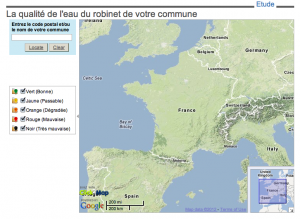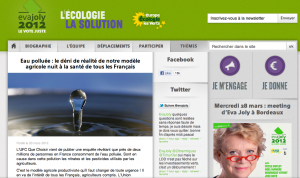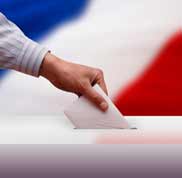Let Them Drink Evian?
By Emma Knight
March 22 was World Water Day, but before we open the faucet and knock back a few, there is something we need to talk about: nearly two million people across France do not have access to drinkable tap water, according to a report published Tuesday by the Federal Union of Consumers (UFC), and the main culprit is agriculture.
The drinking water provided by 2,747 French townships is polluted, disclosed the report, which is based on tests published by the Ministry of Health. The studies deemed tap water “sub-standard” if it revealed abnormally high levels of one of the following ingredients in over 25% of trials conducted in a two-year period: pesticide residue, nitrates, bacteria, aluminium, selenium, or “natural” radioactivity.
The good news is that 97.5% of French residents have free access to high-quality drinking water. The disturbing part is that 1.76 million people do not. The UFC posted an interactive map of France on their website, allowing users to see whether their faucets are affected (click on the image below to access the tool).
Authorities pointed weary fingers at industrial farming, which is responsible for 69% of the contamination. The correlation between intensive agricultural regions and regions where the UFC judged water undrinkable is “perfect,” said Olivier Andrault, one of the report’s authors to French business daily Les Echos. “The problem comes from the recurrence of factors that have not been dealt with for years,” said René Lalement of the National Office of Water and Aquatic Environments (ONEMA) to newspaper Le Monde.
contamination. The correlation between intensive agricultural regions and regions where the UFC judged water undrinkable is “perfect,” said Olivier Andrault, one of the report’s authors to French business daily Les Echos. “The problem comes from the recurrence of factors that have not been dealt with for years,” said René Lalement of the National Office of Water and Aquatic Environments (ONEMA) to newspaper Le Monde.
Despite significant media coverage, the report made barely a ripple on the presidential campaign. Predictably, only the Green Party (EELV) candidate Eva Joly took active notice. Joly responded to the report on Twitter:

“Polluted water: our agricultural model’s denial of reality is damaging the health of all French people,” said her tweet, which included a link to her website, where she further expressed her outrage.
 “It is the model of agricultural mass-production that must urgently be changed! It is in the interest of all French people, farmers included,” she wrote. “Water is a common good that needs protection. The health of French people can no longer suffer from the absence of environmental and sanitation politics.”
“It is the model of agricultural mass-production that must urgently be changed! It is in the interest of all French people, farmers included,” she wrote. “Water is a common good that needs protection. The health of French people can no longer suffer from the absence of environmental and sanitation politics.”
The other presidential candidates did not convey alarm, despite strong warnings from experts. Alain Bazot, the president of the UFC, told Le Monde that a perilous future awaits if France continues to pursue such intensive methods of monoculture (the aggressive farming of one crop in a given area).
The report further demonstrated that while France has managed to reduce the volume of pesticides used over the past decades, the positive effects have been counteracted by the use of more potent and pollutant chemicals. Similarly, reduction in the use of nitrates (chemicals in fertilizes that can have damaging effects on human health) over the years has been very slow. A 1991 directive requires France’s water authorities to evaluate nitrate levels in surface and groundwater tables every four years. The latest study, conducted between October 2007 and September 2008, shows that the improvements made have been sluggish at best.
Many may be tempted to content themselves with glass-nearly-full platitudes, given the 97.5% score, but when it comes to the fundamental human needs of nearly two million people, close will not cut it. France is a developed country endowed with plentiful freshwater resources. It is also the birthplace of Evian and Perrier. To add irony to injury, last week it hosted the sixth annual World Water Forum in Marseille, whose goal is to to “bring water [onto] all political agendas.”
Given that a large part of the issue is rooted in agricultural practices, the solution is within clear political reach. The true problem is that, of all the candidates, only Eva Joly seems to care.
Where is Erin Brokovich when you need her?



0 Comments
Post new comment